This is a game in which the person who earns 2000credits as a merchant who crosses the galaxy wins. To do that, players deliver luggages, become the owner of a spaceport, send passengers, and pick up relics of the past.
Overview
A pick-and-delivery game that takes 90 to 120 minutes.
I have the 2nd edition and I can play the new rule called the standard rule, but I always play the classic rule.
The purpose is simple.
All you have to do is run around the universe, stop by the planet, buy the goods, and deliver them to the planet which wants them.
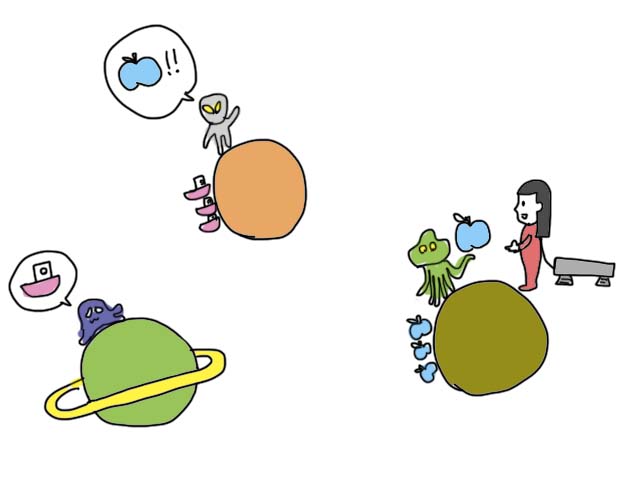
You buy goods on a planet …
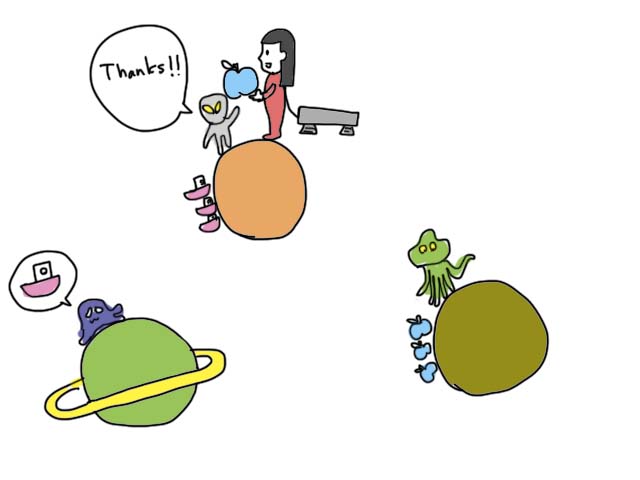
And you take it to the planet which want it and sell it. And you purchase new goods there and take it to the next planet... you repeat that.
Game board↓
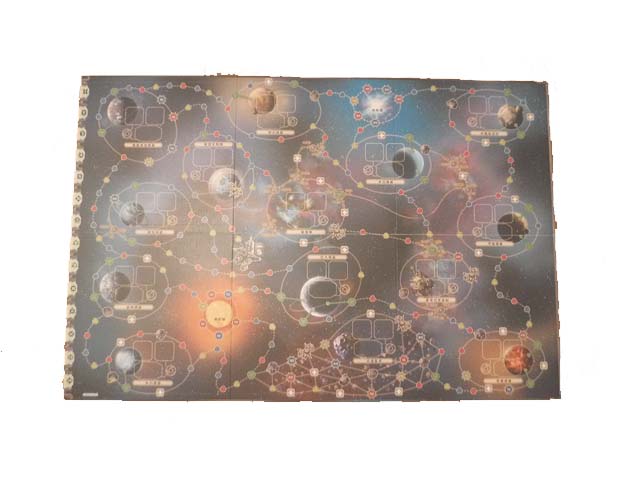
The place where the picture of the alien is drawn is planet.
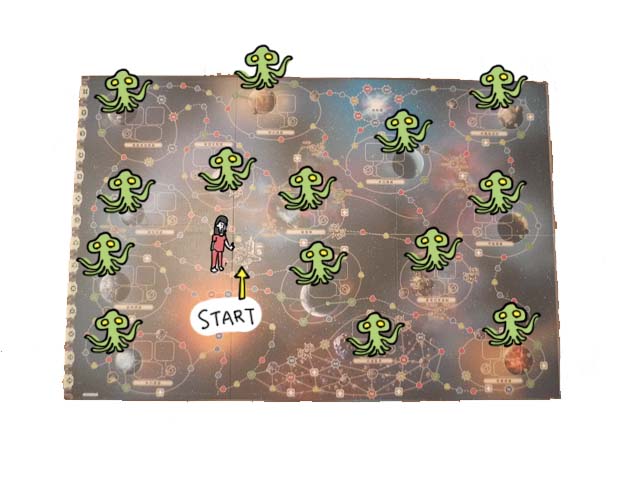
The starting point is around the left of the center.
This board is well designed.
A three-way junction is easy to go from top to bottom, but difficult to return from bottom to top. It's not impossible to return, but it only succeeds with a low probability. Once you have the Merchant Ships equipment, it will be easier to pass.
There are branches like this everywhere, and there is a great deal of variation in the accessibility of one planet to another.
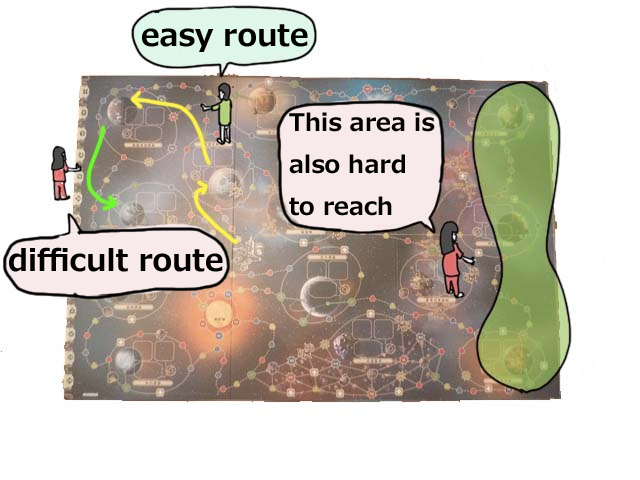
Moreover, the current economic center of this universe seems to be on the left side,
The former center, now obsolete, is hard to reach on the right side.
We can feel the history of the universe.
What's more, the randomly placed warp tiles make a big difference from game to game.
14 cultures are randomly placed on the game board. We don't know which culture lives until we arrive there. we are excited about the unknown universe.
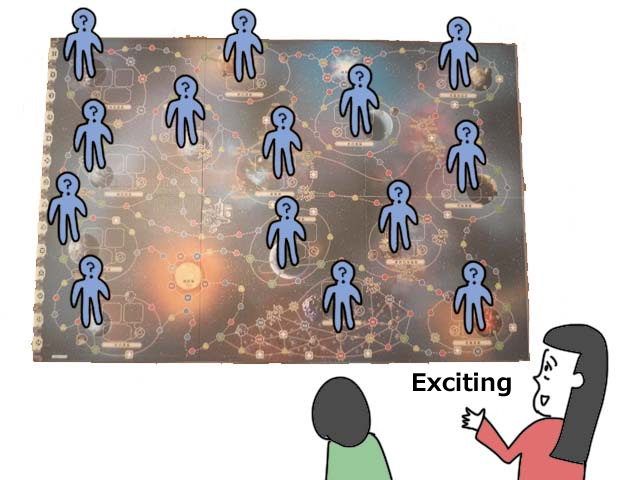
When I first played with my husband, when the culture of the third planet was revealed, I realized that this was a really interesting game.
..
The explanation in my head at that time is like this.
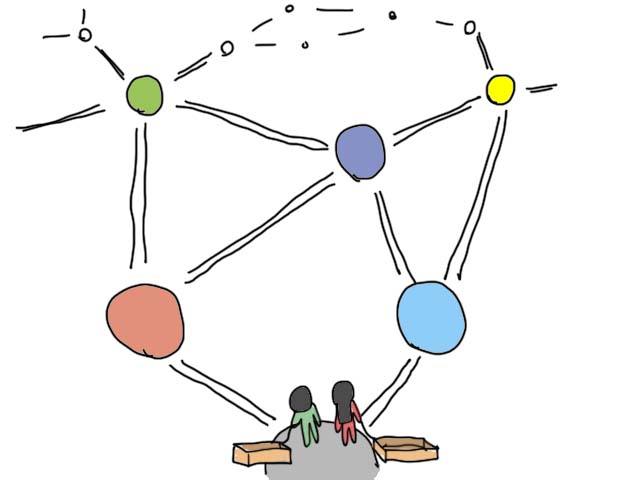
start
I went to a nearby planet. culture A lived there. There are items that A sells.
I bought it. The cultures that buy A's items are B, C, and D. I still didn't know where they lived.
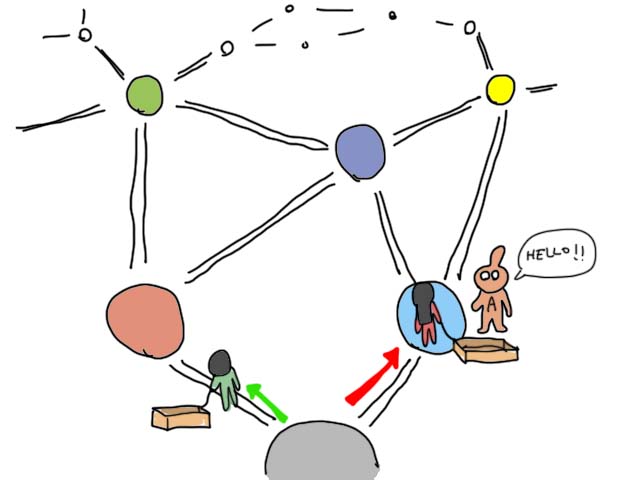
I will buy it for the time being.
With it loaded on the ship, I headed to another planet nearby for the time being.
It was culture G that lived there. Sorry. However, culture A will buy the goods sold by culture G!
This was a chance. There was still one room available, so I planned to buy this item, go back the way I came, and sell it to culture A to earn a profit. Let's go back and forth.
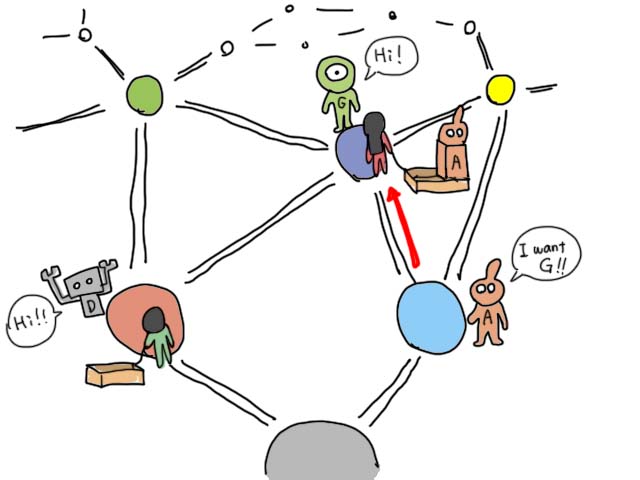
Meanwhile, another player reached the red planet.
The culture that lived there was D!
G will buy D's items.
That means that the triangular trade route of selling D to G, selling the G I bought there to A, and then selling the A I bought to D … will be completed!
When that happened, various strategies came to my mind.
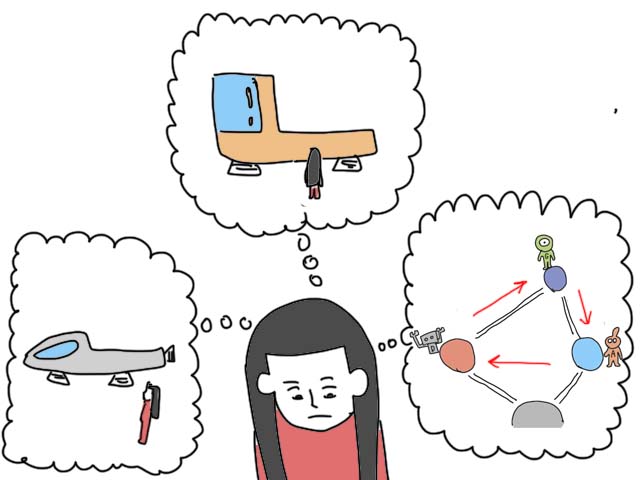
Should I buy a ship that can carry a lot? Should I buy a fast ship with a small load?
Should I make money on the triangular route for a while?
I can buy and sell two products at a time if I collect profits.
Should I change to a larger ship and carry 3 products at a time?
Or is it better to move frequently on a fast ship?
Or such an idea is also good.
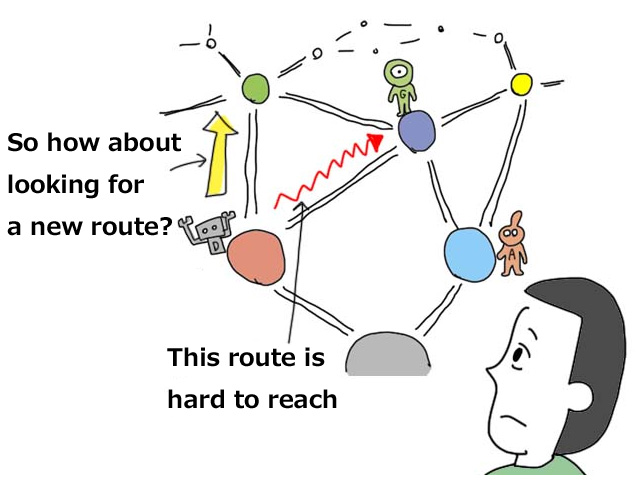
D⇒G is difficult to pass and is inefficient, so why not go further and develop better sales channels?
It is also good to develop a new planet aiming for a deposit.
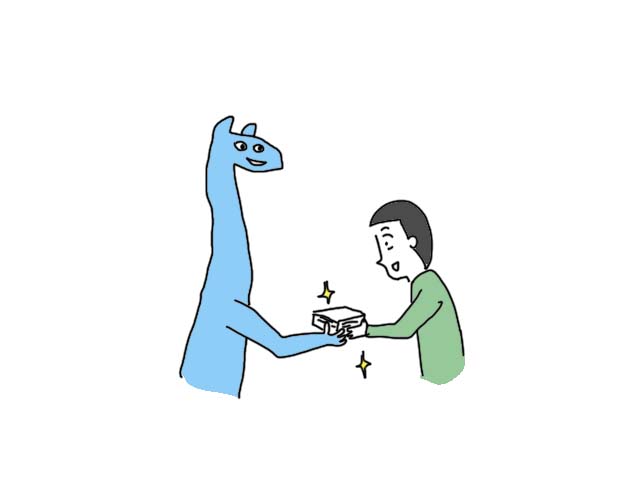
"Thank you for coming" "Thank you!"
A deposit is a currency that can only be used on the planet, given to the player who discovers the culture for the first time.
This deposit is very useful as we have very little money in the early stages.
What this feeling of freedom! Super fun!
The system for managing the number of items on the board is sophisticated.
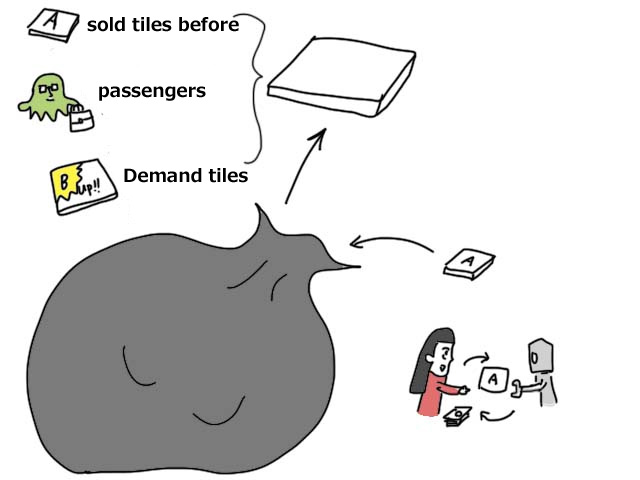
For example, when Item A is sold, it will be placed in a black box and a tile will come out of the black box instead.
Inside the black box
Passenger tiles waiting to be transported from a specific planet to a specific planet
A demand tile that indicates that demand is rising on a particular planet and that culture will buy the item at a higher price.
And it contains the item tiles that have been sold so far.
Therefore, it is random when the products that have been sold will come back.
In other words, even if a route for efficient triangular trade is built and everyone rushes there,
Naturally, the number of goods has disappeared, and we have no choice but to develop other routes.
Gradually, more profitable demand tiles will accumulate on other planets, so the system is designed to encourage new development.
Due to the spaceport rule, you can usually only load and unload one item on the turn you arrive at the planet.
At the spaceport built by the player, you can buy and sell multiple times on the turn you arrive.
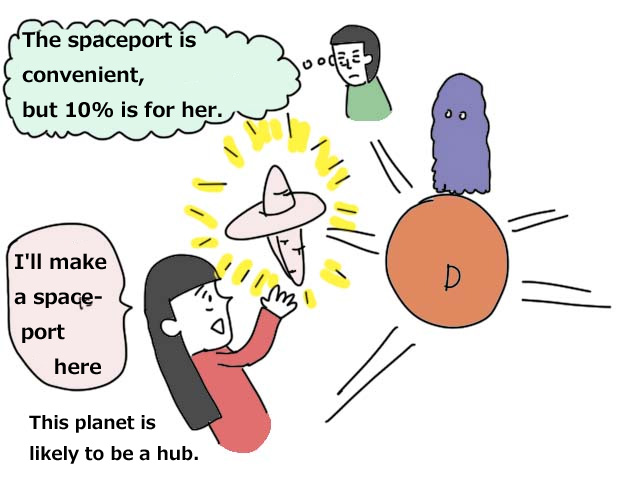
Since 10% of the transaction value is kicked back to the player who built the spaceport, if you build a port on the planet that is often used on the route, you will get unearned income.
The number of goods in stock on that planet, the ease of movement between planets, the efficiency of the route, the type of your ship, the equipment of the ship, whether to build a spaceport, etc …
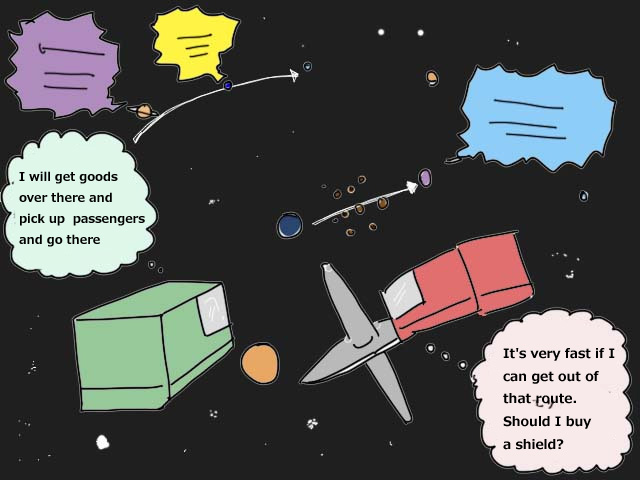
While calculating such variables in our heads, we will select the route that will make the most money and develop our business.
And the player whose assets reach the target amount is the winner.
Final thoughts
Games with fluctuating market prices are fun because you can enjoy the feeling of running your own business.
Ultimately efficient triangular routes were discovered and everyone rushed there, but as inventory decreased and other planets' product requests increased, the value of that route gradually declined, and each one Players voluntarily choose to develop new sales channels.
It happens naturally even though the game rule isn't instructed to do so.
At that moment, you can feel as if each person is in control of the company.
It takes a long time to play, but I definitely want you to play this game. The rules are simple, and the difficulty is not so severe, so it is a masterpiece that even beginners can enjoy.
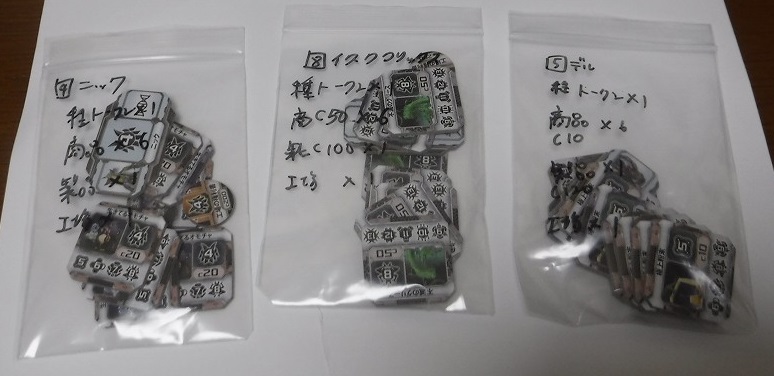
The hassle of setup is a feature of this game.
When cleaning up, if you put the First Contact Card, goods, and spaceport tiles for each culture in one bag, it will be easier to play next time.
All you have to do is place the cards, start the game, and take out the revealed culture bag.
Depending on the situation, the game may end without revealing about 2 cultures until the end, so it is recommended storage.

